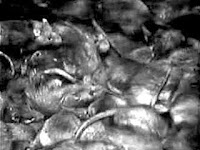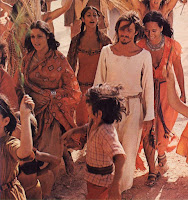My sleep is not so good these
days. I am woken from my slumber these nights to a head full of spinning, disturbing
images. A parade of early morning myrmidons marches past my mind's eye. My heart pounds,
matching the beat of big bass drums and the tromping of boots in passing
parades. Images of prison camps full of inmates with gaunt faces and fearful demagogues whipping maniacal throngs into a frenzy dominate my now-wide
awake mind demanding my full attention.
Nightmarish questions repeatedly
pose themselves: What would a Trump
America look like? Would it still be America? And what would happen to the people
I love and serve? What would happen to people like me?
In my visions, the pouting face
of the American l’enfant terrible rises
full center, sneering the words Muslims and Mexicans as if they were synonyms
for excrement. I think of my many Muslim and Latin American students. I know
some of them are immigrants, the documentation status of whose parents I would
not want to guess. I watch their faces in class, their wide open eyes.
I wonder how they hear this. Do they tremble to think
this deeply misanthropic insecure man might one day soon have power over their
lives?
And I wonder, is this what the
Jews and the other vulnerable populations felt in 1930s Germany?
No Option to Remain Silent
Perhaps these midnight torments
come because the Holocaust, its medical experiments and the Nuremberg Trials
have recently been a part of my ethics classes, the run-up to the Belmont Report we
talk about in class. Perhaps it is because of the polling data that suggests
that the possibilities of Trump actually winning the election are improving.
It’s hard to know why.
Nightmares have a live of their own, even the waking kind.

As a clergy person, I would
have been pressured to either buy into the Protestant Reich Church or to remain
silent in the face of a Devil’s Bargain cut between Pope Pius and the Fuhrer.
Either option would, no doubt, have proven impossible for me.
As an academic, the torture of
watching the inhumane treatment of friends and neighbors and the demeaning of
critical reason into a subservience to a shallow rationalization of the Reich
would have proven too much. I could not have remained silent.
And finally as a gay man, for
the first time in his life proudly living with his life partner of 43 years, celebrating
his hard-won legal marriage now in its sixth year, I would have been required to
wear a pink triangle before being shipped off to the death camps. The recent wine-sodden
heydays of the rowdy cabarets of Berlin would now seem as if another lifetime.
His Own Brand of Danger
Maxim often misattributed
to Sinclair Lewis
I do not construct Donald
Trump as an American Hitler. There is enough difference between these two
figures and between his followers and the Brownshirts – though more in degree than
content - to recognize that this is not the resurrection of mid-20th
CE totalitarianism. Trump is actually more like Mussolini than Hitler but in
the end is not a repeat of either of those tyrants.
Trump presents his own brand
of danger.
But it is the tone of his rhetoric,
his unchallenged consistent dishonesty and his complete unpredictability that suggest
to me that it would not be prudent to convince myself, as did the future residents
of the death camps of WWII Europe, that something like those troubled times couldn’t
happen here. It was, after all, the world’s best educated people in the most
technologically advanced culture on earth of its time who produced these
horrors even as the world assured itself this simply couldn’t happen, that the
Germans simply couldn’t do the things that eventually they did.
Prior to WWII, the atrocities of
Hitler’s Germany were believed to be “unthinkable.” Right up to the point the
camps were liberated. Indeed, some of its victims walked naked down long halls
into gas chambers convincing themselves that the unthinkable simply could not
happen. No one would do something like that.
An Unchecked Downward Spiral
I keep asking myself how we
got to this point. How could this be happening?
At first, I saw the references
to women’s menstrual cycles and bathroom practices during the Republican debates
as the aberrant behaviors of an uncouth reality show clown. It is perhaps a predictable result
of an entertainment industry which has spiraled down into the muck of shallow,
adolescent humor, desperate for any kind of response from its addled audiences. Like any
addiction, the audience has become numb to the last round of obscenity and
requires ever greater sensual assaults to be stimulated.
Then came the mockery of the
disabled man. And, as the brother of a sibling with a disability, I wondered
first how anyone could do something like that and then why the media continued
to replay that imagery knowing how hurtful it must be.
This was followed by the racist
libel of Mexicans as rapists and criminals. Trump talked about building a wall
across our border at that point. As I watched Trump gaining popularity it began
to occur to me that the wall might be less designed to keep Mexicans out than to
keep Americans in.
Then came the deliberate and
ongoing confusion of the world’s second largest religion with terrorism. All
Muslims would become suspect. And life for a group of Americans identified only
by a religion whose numbers now equal those of Episcopalians and Mormons would
become even more difficult in a culture whose infotainment industry already
tends to paint them as terrorists.
I keep thinking that surely
the American people will awake from this spell. I keep hoping they will swear
off their guilty pleasures provided by this sophomoric con-man who allows them
to indulge their unbridled bigotry and exacerbate that misanthropy with intellectual dishonesty, self-righteously rationalizing it as a revolt against “political
correctness.”
But tonight, on the eve of the
debates, such as they will be, the polls say that if the election were today,
America’s King of Crass, the choice of the Russian strongman Vladimir Putin and
the Grand Wizard of the Ku Klux Klan, might well win the right to move into the
White House.
The march of the myrmidons
would be on.
The election of Donald Trump
would signal to me that this is no longer the country in which I grew up, the
country whose people and institutions I have spent my life serving and whose
principles I once admired. That America, for all of its flaws, would be dead.
Trump’s election would also signal that people like me no longer have a place in the country that has replaced it. My life of service to that America, my values and those of people like myself will not only be rejected by such an election, I fear they would pose ongoing liabilities for me as a resident in Trump’s America much as they would have in the run-up to the Third Reich. The only questions then remaining would be how much danger I could be facing, how quickly that would materialize and what, if anything, I might be able to do to escape the tidal wave of unleashed rage in Trump’s America.
It would be only a small comfort to know I would hardly be alone in that fearful calculation.
The Crazy Woman Who Proved Prescient
Within a couple of hours, the
myrmidons march off and my interrupted sleep creeps back to claim its rightful turn, my
weary mind fading to gray. The awful parade rolls away leaving me, as I drift back to sleep, wondering
how I and others like me can possibly survive if these nightmares ever actually come
true. I will awake in a couple of hours still troubled.
It is easy to dismiss as paranoid the
rantings of sleep-starved writers and social critics spinning worst case scenarios. Dismissal usually serves as a fairly effective means of avoiding disturbing
considerations. It’s a lot easier to shoot the messenger, to put them out of
our misery, than to deal with the disturbing messages they bear.
In perhaps the most widely read account of the Holocaust, Night, the late Elie Wiesel describes a woman named Madame Schacter
who begins to mentally decompensate in the rail car enroute to the Auschwitz death camp.
She has a terrible vision of a consuming fire and becomes increasingly loud and
hysterical as she describes it.
The train car occupants demand
she stop, shouting at her before finally beating her into submission, her shrill alarms reduced to
soft, mournful sobbing. The calm has been restored, the collective denial of
the freight car's human cargo allowed to return...right up to the arrival at the gates of
Auschwitz.
For in the end, it was the disturbing vision of Madame Schacter,
who also knew only too well the parade of early morning myrmidons, that proved
prescient.
+++++++++++++++++++++++++++++++++++++++++++++++++++++
If the unexamined life is not worth
living, surely an unexamined belief system, be it religious or political, is
not worth holding.
Most things worth considering do
not come in sound bites.
Do not be daunted by the enormity
of the world's grief. Do justly, now. Love mercy, now. Walk humbly now. You are
not obligated to complete the work, but neither are you free to abandon it. – Rabbi
Rami Shapiro, Wisdom of the Ages, Commentary on Micah 6:8
+++++++++++++++++++++++++++++++++++++++++++++++++++++++






















